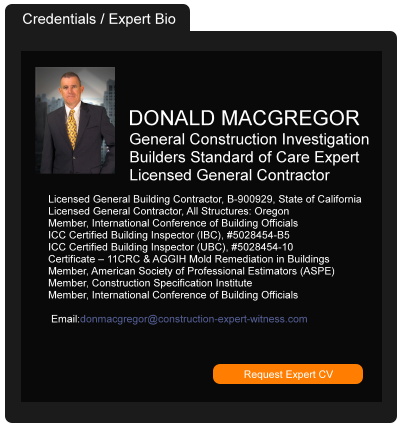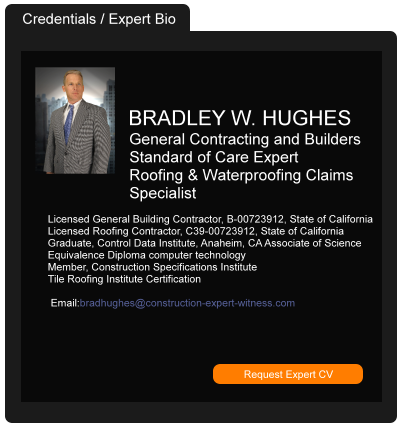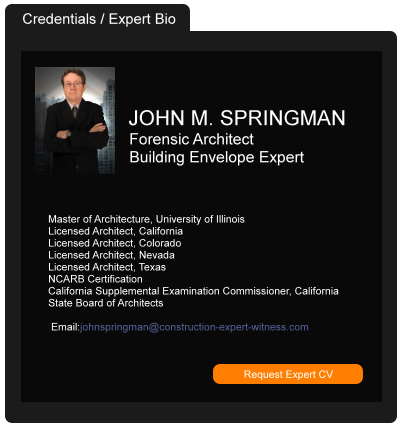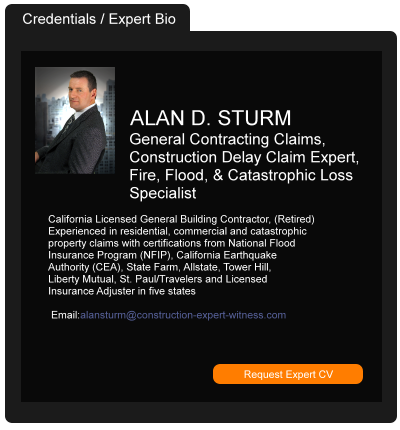Contractors Should be Aware of Homeowner Duties When Invited to Perform Residential Work
September 26, 2022 —
Joshua Lane - Ahlers Cressman & Sleight PLLCDivision 2 of the Court of Appeals
[1] recently addressed a property owner’s liability to a contractor who is injured performing work on their property.
The action arose from an incident in which Virgil Mihaila, a remodeling contractor, fell from a ladder while installing a new roof on the Troths’ shed and landed on a metal grounding rod that was sticking over a foot out of the ground. Mihaila saw the grounding rod as he was working and recognized the danger, but he claimed that he could not complete the roofing job without encountering it. Although he tried to position his ladder so that he would avoid the grounding rod if he fell, he somehow fell off the ladder and landed on the grounding rod, sustaining multiple rib fractures and a punctured lung.
Mihaila filed a complaint against the Troths, alleging that they were negligent in failing to protect him from the danger of the grounding rod sticking out of the ground. The Troths denied that they were negligent and asserted the affirmative defense of contributory negligence. The Troths filed a motion for summary judgment, which the trial court granted, stating that summary judgment was appropriate regarding the Troths’ duty because Mihaila “became aware of the risk, undertook to encounter the risk, and made his own efforts to mitigate the risk.” The trial court denied Mihaila’s motion for reconsideration and Mihaila appealed.
Read the court decisionRead the full story...Reprinted courtesy of
Joshua Lane, Ahlers Cressman & Sleight PLLCMr. Lane may be contacted at
joshua.lane@acslawyers.com
In Texas, a General Contractor May be Liable in Tort to a Third-Party Lessee for Property Damage Caused by a Subcontractor’s Work
February 16, 2016 —
Michael L. DeBona – White and Williams LLPIn Zbranek Custom Homes, Ltd. v. Joe Allbaugh, et al., No. 03-14-00131-CV, 2015 WL 9436630 (Tex.App.-Austin Dec. 23, 2015), the Court of Appeals of Texas, Austin, considered the circumstances under which a general contractor can be held liable for injuries to a non-contracting party’s property. The court held that, because the general contractor, Zbranek Custom Homes, Ltd. (Zbranek), exercised control over the construction of the fireplace at issue, Zbranek owed a duty of care to the first lessees of the home that Zbranek built.
In Zbranek, Bella Cima Developments, L.P. (Bella Cima) hired Zbranek to act as the general contractor for the construction of a home. As the general contractor, Zbranek engaged various subcontractors to perform different aspects of the construction, including the framing, stucco and masonry work for an outdoor fireplace.
Read the court decisionRead the full story...Reprinted courtesy of
Michael L. DeBona, White and Williams LLPMr. DeBona may be contacted at
debonam@whiteandwilliams.com
Comparing Contracts: A Review of the AIA 201 and ConsensusDocs - Part I
March 22, 2018 —
Michael Sams and Amanda Cox – Construction Executive, A publication of Associated Builders and Contractors. All Rights Reserved.Here’s a helpful comparison of and analysis of some important contract sections in the
AIA 201 (2007 and 2017 versions) and
ConsensusDocs (2014 and 2017 versions). While not intended to be all inclusive, this summary comparison of the contract documents will run as a three-part series. Part I covers Financial Assurances, Design Risk, Project Management and Contract Administration. Part II will cover Schedule/Time, Consequential Damages/LDs, Claims and Disputes/ADR. Part III will cover Insurance and Indemnification and Payment.
FINANCIAL ASSURANCES
- What assurances are there that the owner can pay for the project?
- The Contractor should have the right to request and obtain proof that the Owner has funding sufficient to pay for the Work. The provision should also provide that the Contractor may terminate the Contract if the Owner refuses to allow a review of funding documents, or should the Contractor reasonably determine that the Owner does not have sufficient funds to pay for the Work.
Relevant Sections:
- A201 2007 Section 2.2.1; 2017 Section 2.2.1-2.2.2 A201
- 2014 & 2017 ConsensusDocs 200: Section 4.2
AIA:
- Section 2.2.1 A201 2007 & 2017: Both editions require the Owner, upon Contractor’s written request, to provide, “reasonable evidence that the Owner has made financial arrangements to fulfill the Owner’s obligations under the Contract.” Thereafter, the Contractor may only request such evidence if (1) the Owner fails to make payments; (2) a change in the Work materially changes the Contract Sum; or (3) the Contractor identifies in writing a reasonable concern regarding the Owner’s ability to make payment when due. If the Owner does not comply, the Contractor may stop work.
- Additionally, A201 2017 Section 2.2.2 awards costs to the Contractor for demobilization and remobilization.
Reprinted courtesy of
Michael Sams , Kenney & Sams and
Amanda Cox, Kenney & Sams
Mr. Sams may be contacted at mpsams@KandSlegal.com
Ms. Cox may be contacted at ajcox@KandSlegal.com
Read the court decisionRead the full story...Reprinted courtesy of
Ensuring Arbitration in Construction Defect Claims
February 04, 2013 —
CDJ STAFFJared E. Berg and John W. Mill of Sherman & Howard note that developers and general contractors would prefer that construction defect claims against them go to arbitration, instead of ending up in front of a jury. They say “there is a way to do this.” For the developer and general contractor, arbitration is “typically less costly and time consuming than litigation.”
On the other side, home owner associations “tend to prefer litigation because the up-front costs of arbitration are greater and they would rather have their cases tried to a jury than a panel of arbitrators in the belief juries offer greater potential for high damage awards. In order to avoid arbitration, “HOAs have taken advantage of their statutory rights to amend declarations by instructing their members to approve amendments removing arbitration clauses.
However, in a recent Colorado case, the developer had taken a precaution of including in the arbitration clauses that “they could not be removed from the declarations by amendment with the developer’s and general contractor’s consent.” The homeowners association had voted to remove these clauses, but the judge found that they could not do so.
Berg and Mill give the advice to “include in the declaration’s arbitration clause a provision making your consent required to amend or nullify the arbitration provision,” adding that “courts will enforce this kind of consent provision.”
Read the court decisionRead the full story...Reprinted courtesy of
New York Condominium Association Files Construction Defect Suit
December 10, 2015 —
Beverley BevenFlorez-CDJ STAFFAccording to The Real Deal, “The condominium association at 15 Union Square West has filed a $5 million lawsuit against developer Brack Capital Real Estate eight years after the building first launched sales, alleging that the firm did not deliver the quality of units it promised when residents originally signed their contracts.”
Alleged problems include roof leaks, lack of terrace landscaping, and patchy electrical work, The Real Deal reported.
A spokesperson for Brack stated, “We stand behind our product and are very proud of it.”
Read the court decisionRead the full story...Reprinted courtesy of
Can Businesses Resolve Construction Disputes Outside of Court?
August 19, 2024 —
Scott L. Baker - Los Angeles Litigation BlogTime is of the essence in any construction project. So, if a dispute arises at any point, business owners generally wish to avoid the chance of a time-consuming case going to court.
Can California construction businesses
manage these disputes effectively outside of court? It is possible in some cases. Business owners should carefully consider these three steps.
1. Go Back to the Contract
Even if the contract is at the center of the dispute, it is important to refer to any details regarding dispute resolution included within the document. It is common for contracts to have some form of a dispute resolution clause. In such a case, both parties should follow the steps outlined in that agreement.
Read the court decisionRead the full story...Reprinted courtesy of
Scott L. Baker, Baker & AssociatesMr. Baker may be contacted at
slb@bakerslaw.com
Hundreds Celebrated the Grand Opening of the Associated Builders and Contractors of Southern California Riverside Construction Training Center
February 14, 2023 —
Associated Builders and ContractorsRIVERSIDE, Calif., Feb. 10, 2023 (GLOBE NEWSWIRE) -- Today the Associated Builders and Contractors Southern California Chapter (ABC), hosted hundreds of community members as they cut the "ribbon" of their third training center in Southern California.
"Today is a celebration, but it also represents a continued commitment by ABC and our membership to supply a skilled, trained, and safe construction workforce for Southern California," stated Nick McFayden, ABC SoCal's Board Chair.
Jon Krystafik, Vice Chairman of the Training Trust commented, "Our training facility is unique. You may have toured other facilities but with ours you will see we don't just train one craft. Here Apprentices and Craft trainees are receiving cutting edge training in Electrical, Plumbing, Low Voltage and HVAC/Sheet Metal." Krystafik added, "Our trustees had a dream 10 years ago to train residents in the inland empire. Today it is a reality!"
ABC Southern California Chapter is an association of contractors that believe in the Merit Shop Philosophy. Merit shop encourages open competition and a free enterprise approach that awards contracts and employment based solely on merit, safety, quality, and cost, regardless of labor affiliation. The chapter is one of 68 throughout the country and represents nearly 400 member companies.
Read the court decisionRead the full story...Reprinted courtesy of
Construction Trust Fund Statutes: Know What’s Required in the State Where Your Project Is Underway
June 22, 2020 —
Christopher D. Cazenave - ConsensusDocsConstruction trust fund statutes have been around for decades. At least 15 states have passed similar statutes. Other states, but not all, do not have an express statute but have interpreted state law to hold that payments received by a general contractor and deposited in a business account establishes a “trust fund.” See e.g., Cal. Bus. & Prof. Code § 7108.
The purpose of these laws is straightforward—protect contractors and suppliers against nonpayment for the labor and materials provided for the construction or repair of property. But while the purpose is straightforward, each state’s law differs by imposing different requirements, different privileges, and different remedies. This article provides an overview of how these statutes work as well as a sampling of important requirements and potential pitfalls that you should look out for when a construction trust fund statute applies to your project.
Read the court decisionRead the full story...Reprinted courtesy of
Christopher D. Cazenave, Jones Walker LLPMr. Cazenave may be contacted at
ccazenave@joneswalker.com


































































